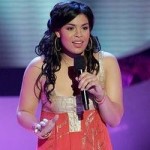A recent commentary on Christian Music Today entitled “‘Idol’ Worship?” obviously caught my eye since one of my other blogs on the b5media network is Idol Stalker.
This specific article discusses the copying or imitations of American Idol type shows for Christian artists to participate in, like Gifted on TBN or Gospel Dream on the Gospel Music Channel.
They polled readers to find out if they liked the Christian spin-off ideas of Idol and the results were down the middle: 46% in favor and 54% against.
One thought in general that has sparked some discussion came from the following:
Of those voting in our poll against a Christian version of Idol, half felt that such programming comes across as “derivative and inferior.” Another 15 percent thought that a talent competition by definition cannot be focused on glorifying God, preoccupied instead with finding the best of the best. And the other 12 percent of voters wondered if we really need an American Idol for Christians when Christians are already making inroads with American Idol.
Do viewers put any weight into statements made by Idol contestants stating that they are professing Christians? Mandisa last year, George Huff in previous years, Jordin Sparks has toured with Michael W. Smith. Do we really see them as Christian? Or, do we categorize them similarly to professional atheletes that do the same? The article provides a nice summary of this season’s “faithful” contestants:
Jordin Sparks has garnered the most attention in CCM circles. The daughter of former NFL player Phillippi Sparks, she regularly performs at her home church, was a finalist for the Gospel Music Association’s Seminar in the Rockies, and even opened on tour for Michael W. Smith, who gives his endorsement.
Melinda Doolittle is a graduate of Nashville’s Belmont University, a Christian school, and has sung backup for the likes of CeCe Winans, Denver & The Mile High Orchestra, and Aaron Neville. She’s not only impressed everyone with her vocal prowess, but also her humble attitude—friends describe her as a “really strong” Christian woman and a prayer warrior.
Chris Sligh, the son of missionary parents, has attended three different Christian colleges in the last ten years. Lately he’s served as a worship leader at his home church while fronting his own band, Half Past Forever. On Idol, he’s already performed songs by Mute Math and dc Talk.
They’re not alone. Phil Stacey has attended two Christian universities and is a minister of music at his home church in Jacksonville, Florida. LaKisha Jones has the support of her friends and family from her home church in Michigan, who say that “her faith is important to her.” Her new friend Stephanie Edwards apparently shares similar values, praying to God for his will before her performances.
Sparking even more discussion that was followed up with in their Music Connections e-mail newsletter, Russ Breimeier shares his thoughts on whether or not artists that are Christians need to be restricted to specific categories or shelves in music stores based on their faith.
I’m continually dismayed by the casual dismissal of other believers. The Fray isn’t an openly evangelical band, but does that mean they must be fallen Christians? Chris Sligh, Melinda Doolittle, and others compete on American Idol … meaning they must not be interested in using their talents to glorify God or build up believers? Does it mean nothing that these artists have identified themselves as Christians in interviews? Isn’t it possible that they might be witnessing their Christian faith behind the scenes?
I agree Russ, and we’ve had some lively discussions on this site as well about this same topic.





